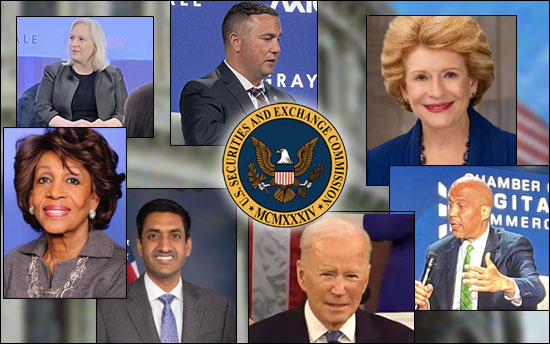A Securities and Exchange Commission (SEC) Chair appointed by a Democratic President under pressure from Democrats? It could happen soon. Republicans are already confronting Chair Gary Gensler and his agency.
Given last week’s demands for regulatory clarity amid an insider trading enforcement action brought by the SEC against a former Coinbase employee and others, blockchain-friendly Democrats may need to confront the SEC directly – likely after this fall’s elections.
Even Commodity Futures Trading Commission’s (CFTC) Caroline Pham seemed perplexed by the SEC’s latest action while quoting from James Madison’s Federalist No. 49. Noticeably silent was SEC Commissioner Hester Peirce whose past calls for regulatory clarity versus the use of enforcement are well-known.
The point isn’t that crypto markets should not be regulated. Far from it. But currently, these new, innovative markets are only regulated through enforcement. If Industry knew the rules at the outset, then it would be less likely to run afoul of securities laws. The SEC seems to be saying that regulation begins and ends with the early 20th century’s Howey Test (see PDF from 2019 on SEC website) and that’s all the clarity needed.
Democratic pressure on the SEC and Chair Gensler could build from any number of Senators and Representatives who are busy working on crypto regulation -even the President. The only thing preventing a Democrat-SEC collision is this fall’s elections as well as an extended crypto winter making crypto less interesting to voters and therefore Congress.
Senators Kirsten Gillibrand and Cory Booker
Senator Kirsten Gillibrand (D, NY), who is co-sponsoring the new Responsible Financial Innovation Act (RFIA), shared at a Bloomberg event this past week that fellow Senate Ag Committee member Senator Cory Booker (D, NJ), will likely co-sponsor the bill.
Respectively, each Democrat has stated in the past the high-level opportunity for key constituencies which may lead to an eventual showdown with an SEC reluctant to undertake new regulatory guidance.
Back in March when the Lummis-Gillibrand partnership was announced, Sen. Gillbrand stated that she wanted to see Wall Street lead in the new innovation trends introduced by blockchain technology for financial markets. And then in May at a Digital Chamber of Commerce event in DC, Sen. Booker told attendees that he saw the potential for crypto and blockchain tech to help underserved communities and close the wealth gap.
Senator Debbie Stabenow
Since early June, Senate Agriculture Chairwoman Debbie Stabenow (D-Mich.) and Sen. John Boozman of Arkansas (R), Ranking Member, are known to be creating a bill giving the CFTC power to oversee parts of crypto markets.
In fact, the CFTC has been making its case on the regulatory front for months including CFTC Chair Rostin Behnam’s appearance in front of Sen. Stabenow’s Ag Committee in February. Commissioner Christy Goldsmith Romero reiterated as much in mid-June. Sen. Stabenow apparently wants to cut the SEC out – to a degree – and CFTC in. (Also of note: Stabenow is on the Senate Finance Committee.)
Representatives Darren Soto and Ro Khanna
Rep. Ro Khanna (D, CA) and Rep. Darren Soto (D, FL) are co-sponsors of the Digital Commodity Exchange Act (DCEA) which is yet another effort aiming to put some crypto jurisdiction under the CFTC. In addition, Rep. Soto has co-sponsored two bills in the House with Rep. Warren Davidson (R, OH) known as the Digital Taxonomy Act and the Token Taxonomy Act which have yet to gain traction.
In June, Rep. Soto told a DC audience, “The holdup is Congress needs to hear back from agencies. I’d wave a magic wand tomorrow and start defining these things, but some of my colleagues want to hear from the executive branch as well.” Will the wand be waved over the SEC?
Representative Maxine Waters
In her position as Chair on the House Committee on Finance, Rep. Maxine Waters (D, CA) is expected to roll out a new stablecoin bill in partnership with Rep. Patrick McHenry (R, NC) if details can be hammered out. Recent stablecoin implosions such as Terra Luna’s algorithmic stablecoin have created bi-partisan urgency on Rep. Waters’ committee to deliver new regulation to protect consumers. Treasury may be involved here too which lends embedded support from the President. The legislation wave may just be starting and the SEC better be ready to change unless they want to tangle with the likes of the powerful Congresswoman.
Democrats in Blockchain-related Caucuses
Meanwhile, across three different congressional caucuses, bi-partisan support persists for blockchain and financial technology:
-
- Congressional Blockchain Caucus (17 Democrats, 21 Republicans)
- Financial Innovation Caucus (2 Democrats including co-chair Sen. Kyrsten Sinema (AZ), 5 Republicans)
- Financial Technology Task Force (6 Democrats, 5 Republicans)
President Joseph Biden
Last but certainly not least, the much ballyhooed Executive Order from Democratic President Joe Biden early in the year signals recognition of an important technological shift and a potential for innovation that the US must get in front of and win regardless of political party. To apply pressure at the SEC before the election, would be admitting a mistake. But at some point post-election, President Biden may ask, “Does the SEC and its Chair serve the future interests of the United States?” and this may also speak to the President’s interests in creating a legacy of innovation.
With a Republican Congress likely next year as well as consistent bipartisan efforts across nearly all blockchain regulation, the President will potentially have plenty of support on both sides of the aisle.

